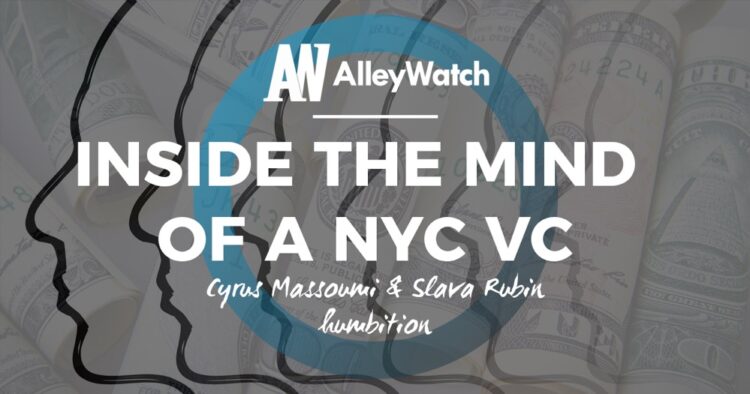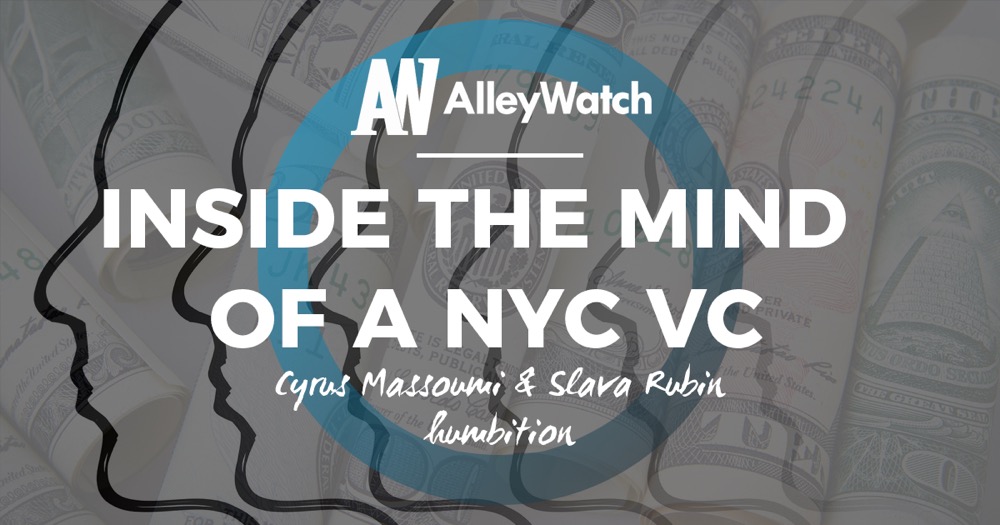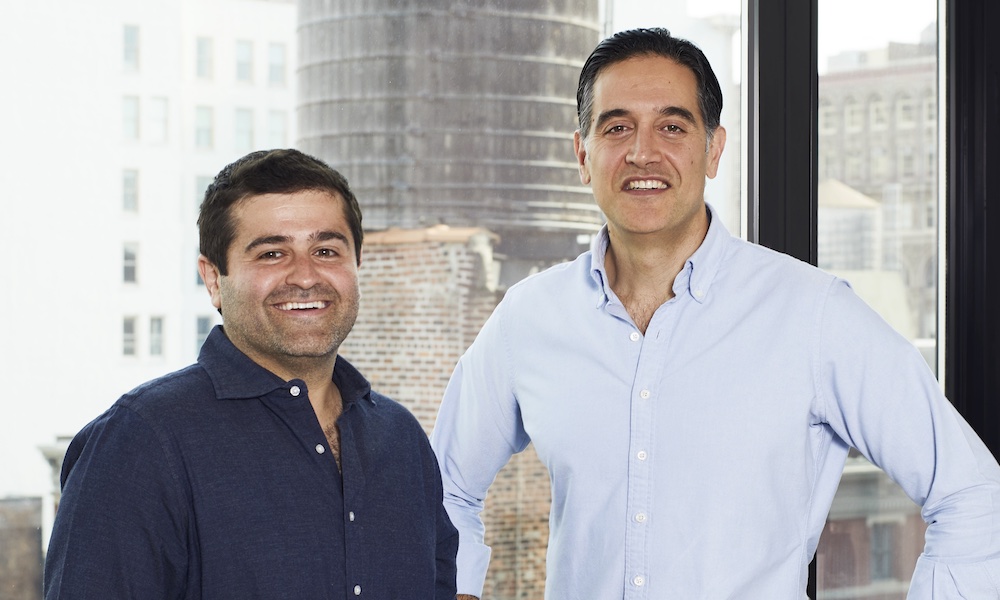Welcome back to Inside the Mind of an NYC VC, a highly acclaimed series at AlleyWatch in which we speak with New York City-based Venture Capitalists. In this first installment for 2019, in the hot seat are Cyrus Massoumi and Slava Rubin of humbition, the founder-focused NYC venture firm concentrated on deeply supporting early-stage operators. Massoumi and Rubin are no strangers to NYC Tech, serving as two of the most prolific founders in the ecosystem with Cyrus cofounding ZocDoc and Slava cofounding Indiegogo. Both companies serve as breakout stories and pillars for the tech community and Rubin and Massoumi bring their operating experience from the trenches to humbition.
Currently investing out of an inaugural $30M fund, the firm has already made several investments including in Burrow and a number of companies that are currently operating in stealth. We visited the humbition offices in Soho to learn more about why these two successful founders got into venture, the firm’s investment thesis, how the NYC Tech landscape has changed over the last decade, how the humbition plans to support the next wave of NYC entrepreneurs, and much, much more…
If you are a NYC-based VC interested in participating in this series, please send us an email. We’d love to chat. If you are interested in sponsoring this series that showcases the leading minds in venture in NYC, we’d also love to chat. Send us a note
Reza Chowdhury, AlleyWatch: Please tell us a little bit about your backgrounds and how/why you started in venture.
Cyrus Massoumi, humbition: I founded Zocdoc in 2007 after rupturing my eardrum on a flight and ran the company for the next eight years. Along the way, I learned that our most helpful investors were the operators. People like Marc Benioff, Jeff Bezos, and the Paypal Founders. It was fantastic to have great founders that we could turn to for advice. And it was that experience that made us want to start humbition – we wanted to connect experienced operators with the next wave of great New York City founders.
Slava Rubin, humbition: I founded Indiegogo in 2008 as a way to democratize access to capital and ran the company for the next nine years. My experience with operators was similar to Cyrus’s – people like Maynard Webb, Max Levchin, Richard Branson, and the Partovi brothers were vital to the process. I’ve been collaborating with startup entrepreneurs for many years now and began angel investing about five years ago. Having enjoyed the experience so much, I wanted to support the next wave of NYC entrepreneurs. So Cyrus and I created humbition.
Cyrus please tell us about how the origin of the name humbition and what it means.
The firm is focused on opportunities in New York and founder-led companies. Why?
In our opinion, there’s a lack of operator-investors working in New York City, especially in Series A. New York City is home to a large number of mission-driven startups that are just not receiving the same level of support as their peers in the Bay Area. For us, this presents a unique opportunity to reach the incredible local talent who need the funding and guidance to build and grow their businesses in the way they deserve.
As for founder-led businesses – we know from our own experience that no one will ever be able to care as much for the business as the founder. It’s just like parenting – you can never hire someone to love and care for your child as much as you yourself would.
How do you define mission-driven?
Honestly, it’s not for us to decide, it’s for the founders. We want founders who are building companies from the heart – their hearts, not ours. Of course, everyone wants to invest in companies that change the world, and yet a lot of companies get funded just to make a quick buck. We want to back companies that actually solve problems that no one has solved before.
How does fundraising as an investor differ from the fundraising you did as founders?
While there are, of course, nuances, it’s generally a similar process. It’s all about having an impressive vision for a company, a focused plan for achieving it, and persistence to do so at the top.
How has tech in NYC evolved since you two started your careers in tech? Any observations – what do we do well and what do we need to improve on?
New York City’s come a long way. The city’s diversity, one of its greatest strengths, is starting to be represented in the startup community, which in turn has led to great companies being founded. Additionally, the city has a larger pool of engineering talent thanks to both public and private efforts.
However, there’s still a long way to go. We’re very bullish on NYC, though, which is why we’re so focused on deploying our capital here.
Is there a specific investment thesis that humbition deploys? Where is the firm’s sweet spot?
Our main areas of investment are marketplaces, consumer and health tech. But our only real requirement for investment is high-quality founders.
We like to deploy $2-4 million of capital after the company has put a strong early team in place and achieved product-market-fit. We find that we can be the most helpful when a company has reached this point.
Our main areas of investment are marketplaces, consumer and health tech. But our only real requirement for investment is high-quality founders.
We like to deploy $2-4 million of capital after the company has put a strong early team in place and achieved product-market-fit. We find that we can be the most helpful when a company has reached this point.
What do you bring to the table as successful founders that have scaled their companies?
As former founders and operators ourselves, we understand the unique challenges inherent in running a business. We bring all our successes and failures to the table. In fact, humbition is really our way of creating something of value from all the mistakes we’ve made. If we can help entrepreneurs avoid some of those mistakes, we think we can help accelerate their success.
You have assembled an impressive advisory network of seasoned NYC founders (ClassPass, Casper, Warby Parker) for the fund. Can you tell us a bit more about that and the role these individuals play working with founders?
For us, it’s important that the people involved with humbition are all active operators. Being current is key in this environment. That’s why we have advisors who are all actively running companies. We use the network for a number of things, including assessing investment opportunities and helping the founders of the companies we invest in.
What are you excited about right now, from an investment standpoint?
We are really excited to see our city emerge as the global hub for health tech. Historically, healthcare has been a trade-off between cost, quality, and access. Typically, you could move one of these factors but only at the expense of the others. Health tech has the potential to fundamentally change this equation where advancements are no longer a zero-sum game.
As the founder of Indiegogo, Slava, you have had a front-row seat for the dynamic shift in funding opportunities available to entrepreneurs. Can you comment on what changes you have seen in the funding landscape since you started Indiegogo?
There’s a growing trend towards what I would call “the platformization of venture” where VC firms are deploying more resources to help portfolio companies. Any thoughts on this? Is it sustainable?
We love NYC and we love entrepreneurs, so we try to help companies whether they’re in our portfolio or not. We’ve found this approach — paying it forward — has resulted in people being more willing to help us and our portfolio when we ask.
But our approach to helping might be a bit different from some. We believe in a pull vs. push model in the support we provide. We look for great operators who are able to accomplish goals on their own. Founders who will keep pushing forward when the going gets tough and continue to iterate to solve the problem they set out to fix in the first place. We have people involved in the fund with experience in the same functional areas that platform firms typically offer and we’ll happily assist them, but it’s not a “services for cap table presence” model.
What do you need to see from teams, both qualitatively and quantitatively, in order to invest?
First and foremost, we’re looking for the best entrepreneurs. Whatever a company is building early on, the only thing you can know for sure is that it’ll change. Therefore, it’s important to back the right people who have what it takes to persevere and keep breaking through the brick walls that pop up.
We then look for market traction and an early understanding of unit economics.
Lastly, we want to know that the team is focused. Too many startups drown because they’re trying to do too much and pursue shiny new objects along the way. Focus is such a strong force in business, and unfortunately, an often overlooked one. For us, it’s essential.
What metrics do entrepreneurs overlook or not place enough emphasis on that are important to consider when you are evaluating investment merit of a business?
Typically we see that entrepreneurs don’t pay enough attention to the cash position and wait until the last minute to raise capital. We like entrepreneurs who raise money when they don’t need it and have something like twelve months of cash in the bank when they kick off fundraising.
Typically we see that entrepreneurs don’t pay enough attention to the cash position and wait until the last minute to raise capital. We like entrepreneurs who raise money when they don’t need it and have something like twelve months of cash in the bank when they kick off fundraising.
What can entrepreneurs do to ensure that the relationship between the firm and companies is fruitful post investment?
As in all relationships, transparency is crucial. It’s obviously great to hear good news, but we’re even more interested in hearing the bad so we can figure out how to be helpful. As previously mentioned, we first and foremost invest in great founders and we’ll always do right by them. At the end of the day, we’re all on the same team.
By virtue of making an investment in a company, there is a demonstrable inclination that a company will do well and you both of you have invested in companies personally that have done very well. Are there are common characteristics that you have observed whether it be in the teams, industries, businesses, or founders in these instances?
Again, it always comes down to the team, so it’s a matter of backing the right people. The name of our fund is a made-up word combining “humble” and “ambition.” We want the founders we invest in to be both humble (which means they can learn from mistakes and listen to input) and ambitious (which means they can dream big).
What are some things that you repeatedly see early-stage companies and founders struggle with?
As founders, we’re all proud of what we’re building, so it can be difficult to admit mistakes or openly discuss our struggles. However, acknowledging mistakes and learning from them is such an important part of being successful. Especially when you have investors who are willing to help.
As founders, we’re all proud of what we’re building, so it can be difficult to admit mistakes or openly discuss our struggles. However, acknowledging mistakes and learning from them is such an important part of being successful. Especially when you have investors who are willing to help.
And then there’s something we already talked about – too many startups do too many things at once. Focus, again, is so critical to success.
Who do you admire in the startup world and why?
We admire people who are focused while still having a strong long-term vision. Jeff Bezos of Amazon and Reed Hastings of Netflix are both great examples.
What’s the last book you read?
Shoe Dog by Phil Knight.
What’s your favorite restaurant in the city?
The Calexico Food Truck in Soho.
One prediction for NYC Tech for 2019.
Series A funding for NYC-based companies will continue to rise.





